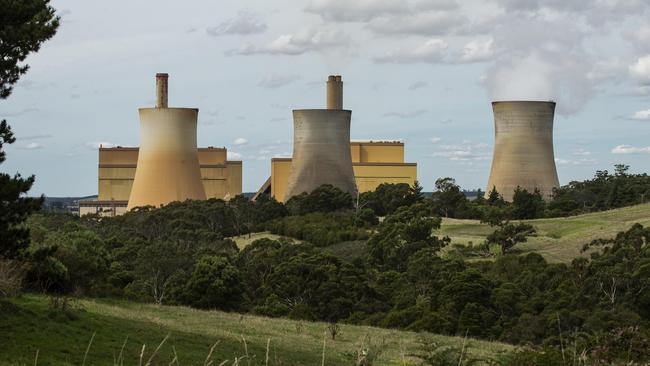Energy crisis: Yallourn coal station closed longer, Mt Piper in NSW shut down for repairs
Parts of Victoria coal plant out of action for a week longer than expected, while half of a major coal station in NSW is also offline.

A quarter of capacity from EnergyAustralia’s Yallourn coal plant in Victoria will remain out for a week longer than expected while half of its Mt Piper coal station in NSW will be forced offline this weekend to repair boiler problems with electricity generators under pressure to reverse an escalating national energy crisis.
The Australian Energy Market Operator intervened on Wednesday and said it would control all prices and supply of generation in a bid to stop power shortages and spiralling household energy bills.
Yallourn, which provides 20 per cent of Victoria’s electricity needs, was due to bring back two of its four operating units this week to help bridge an emergency shortfall of electricity generation in the market.
While one of those units has come back into service, the second will not be available until late next week, EnergyAustralia said.
Its 1430 megawatt Mt Piper station, which provides 12 per cent of NSW’s energy supply, will lose half its capacity this weekend to repair boiler equipment. EnergyAustralia plans to quickly return the unit to service early next week.
Coal supply to Mt Piper is running at lower levels than planned.
“A decade ago, there were six local mines capable of supplying Mt Piper. Today, the power station gets most its coal from the nearby Springvale mine. Production and deliveries are below expected levels in 2022,” EnergyAustralia managing director Mark Collette said.
AGL Energy has pledged to bring back half of its giant Bayswater coal station online by Saturday after engineering issues, with the plant currently running at just 25 per cent capacity.
Unit 4 is expected to return later on Thursday after being out of action for a week due to a maintenance issue on a boiler ash conveyer while Unit 2 is set to return on June 18 following eight days offline to repair a tube leak.
The final remaining unit is due back at the beginning of July with the return date delayed due to the high impact of Covid-19 absences among its workers.
The return to service of AGL’s units may help to soften an earnings hit with Macquarie estimating the power giant faces a $25m-$40m weekly pre-tax loss from the the large chunk of its capacity being offline.
“In NSW, the loss of 4 of 7 units is beyond any hedging strategy,” Macquarie said. “We estimate AGL would be short between 0.11-0.15 terrawatt hours of energy per week. The price administered market/suspension has limited losses associated with the outages. We estimate the loss is in the order of $25-40m pre tax per week.”
Origin Energy also faces a negative drag on earnings from the AEMO suspension.
“To date we have seen no update to FY22 guidance of $310-460m, albeit we see risk to the downside,” Macquarie said.
Origin may experience mixed earnings from the market suspension with its coal and gas generation potentially positive but renewables, batteries and retail markets less positive.
“Even with coal prices at $200-300 per tonne, Origin in the near term is better off as it is selling energy during the middle of the day at $300/MWh. It is hard to be precise but we estimate a gain of $5-10m. We think there appears to have been resolution to the coal deliver issues by rail.”
The gas market is more structured under a suspension with Origin looking at recouping a cost of $9-11 per gigajoule and potentially additional compensation if spot supplies are needed to meet market directions.
Wind and solar have already been sold to customers which may limit any upside unless it has access to uncontracted volumes are availablewhile retail face a “residual loss” due to plants being directed on by the Australian Energy Market Operator.
Increases in retail power prices are now likely for 2024, according to Morgan Stanley.
“We view policy risk as elevated, in view of rapidly rising end user prices - all else equal, we estimate that retail prices would need to rise further in FY24 to cover persistent wholesale price increases and suspension compensation, if required,” Morgan Stanley analyst Rob Koh said.
In taking control of the national electricity market AEMO said it had become “impossible” to operate. The suspension of wholesale electricity trading, imposed at 2.05pm on Wednesday, was justified to stabilise the power system. The suspension will be reviewed daily by AEMO.

